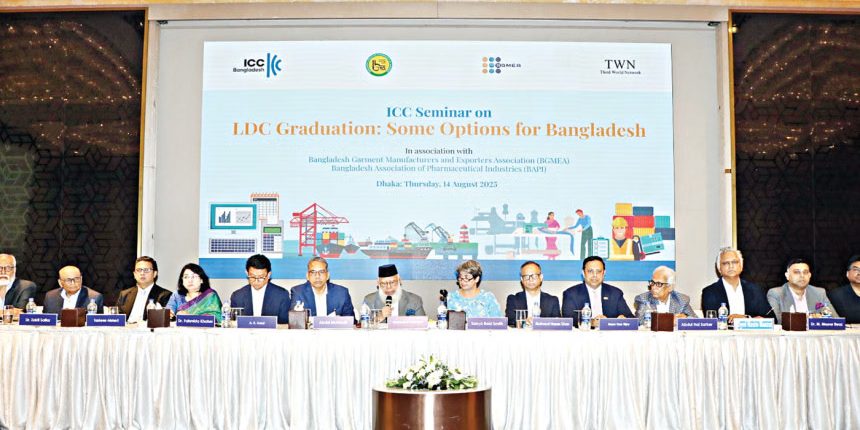Business leaders yesterday urged the government to take initiatives to extend the transition period for Bangladesh’s graduation from the least-developed country bracket for six more years.
“LDC graduation at this moment will be a suicidal decision for the private sector — it will be throwing away the advantage to others,” said Syed Nasim Manzur, president of Leathergoods and Footwear Manufacturers & Exporters Association of Bangladesh.
The interim government has announced that the country will graduate from the bracket as per schedule in November 2026.
The economy has suffered both local and international shocks over the last few years, so Bangladesh needs six more years to graduate, he said.
Manzur’s comments came at a seminar titled “LDC Graduation: Some Options for Bangladesh”, organised by the International Chamber of Commerce–Bangladesh (ICC-B) in collaboration with the Bangladesh Garment Manufacturers and Exporters Association (BGMEA) and the Bangladesh Association of Pharmaceuticals Industries (BAPI).
“Today’s question is not whether we graduate — that is settled. The challenge is how we graduate successfully,” said ICC-B President Mahbubur Rahman while moderating the seminar.
He suggested signing free trade agreements, defending market access, building competitiveness, acting with urgency, and not just planning.
The local businesses could not do many things because of the severe fallouts of the pandemic, the Ukraine war, the high bank interest rates and currency flight, said BAPI President Abdul Muktadir.
So the private sector needs another six years of LDC graduation deferment, said Muktadir, also the managing director of Incepta Pharmaceuticals.
Once Bangladesh graduates, it must comply with the World Trade Organisation’s intellectual property (IP) rules (TRIPS) including 20-year patents on new medicines, said Sanya Reid Smith, legal advisor and senior researcher of The Third World Network (TWN), in her keynote paper.
If a new medicine comes out after Bangladesh graduates, the insulin prices in Bangladesh could be 11 times more expensive so ‘the poverty rate among households needing insulin could increase by between 15 and 200 percent’.
According to a UN report, some of the implications of LDC graduation for Bangladesh include a reduction in preferential export market access such as the EU, the country’s largest export market.
The tariff rate to the EU will increase to 9.6 percent (under developing country preferences or 12 percent at the general rate) once Bangladesh graduates (and the three- year smooth transition period is over) from zero at present.
It will increase to 18 percent from 16 percent for Canada and 12.8 percent from the existing 7.4 percent for Japan, she said.
Bangladesh can demand deferment for three more years but the case should be very strong, said Selim Raihan, executive director of the South Asian Network for Economic Modelling.
However, the two other graduating countries, such as Nepal and Lao PDR, are not demanding deferment, he said.
The Maldives and Guinea fell into trouble after their graduation from LDC status, said Taskeen Ahmed, president of the Dhaka Chamber of Commerce and Industry.
The government’s preparation for LDC graduation is far less than it should have been, said M Masrur Reaz, chairman of Policy Exchange, Bangladesh.
Bangladesh can request a deferment from the UN, said ICC-B Vice-President Naser Ezaz Bijoy.
“This is not a good time for graduation — it will be a challenge for the survival of the businesses,” said Abdul Hai Sarker, chairman of the Bangladesh Association of Banks.
Source: The Daily Star



